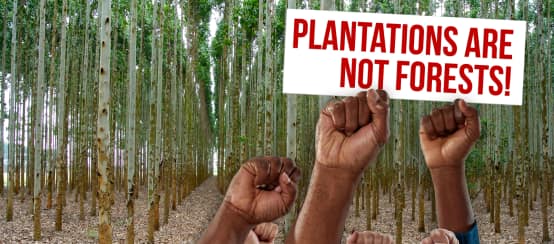Brazil: Stop genetically modified eucalyptus trees!
 © Povo Pataxó
© Povo Pataxó
A Brazilian state commission has granted Suzano, a pulp and paper company, a license to plant eucalyptus trees that have been genetically modified to make them resistant to the herbicide glyphosate. More than 50 organizations are calling for the license to be revoked because of dangers to health, the environment and local livelihoods.
News and updates Call to actionTo: the Chair of the National Technical Commission on Biosecurity (CTNBio) and the Federal Public Prosecution Service
“Revoke the license for the release of glyphosate-resistant, genetically modified eucalyptus trees!”
More than fifty organizations, including Rainforest Rescue, warn that the release of genetically modified eucalyptus poses a serious threat to health and the environment. We demand the immediate revocation of the license for the release.
The license was granted without input from Brazilian civil society or the prior consent of affected communities in the areas where the plantations are to be established. The plantations would serve only the commercial interests of Suzano, the world’s largest producer of paper and pulp products made from eucalyptus, to the detriment of local communities.
The Brazilian National Technical Commission on Biosecurity (CTNBio) granted its approval of the GM eucalyptus already in November 2021. The genetic material of the eucalyptus was modified in the laboratory to make the tree tolerant to the broad-spectrum herbicide glyphosate – also known by its brand name Roundup – which kills all other plants exposed to it.
In 2015, the World Health Organization (WHO) concluded that glyphosate is “probably carcinogenic to humans”.
The GM eucalyptus, designated 751K032, can now be planted commercially in Brazil by the Suzano. The company would thus be able to spray even more agrotoxins over the vast areas of its industrial plantations.
The company claims that the GM trees will increase yield and reduce land requirements. Yet Suzano’s “green deserts” – as the seemingly endless monocultures are called by local people – continue to expand at the expense of communities and the environment: in 2020, there were around 1.3 million hectares of eucalyptus plantations – an area nearly the size of Northern Ireland. In total, Suzano's Brazilian operations cover an area of more than 2.4 million hectares, an area larger than Wales.
BackgroundSuzano
Suzano is the world’s largest producer of eucalyptus-based paper and pulp products, which it markets worldwide. The company’s pulp is used for hygiene products such as diapers and toilet paper, in the medical sector, and for textiles such as viscose. According to Suzano, its products are “present in the lives of more than two billion people”.
Glyphosate
Glyphosate is a broad-spectrum herbicide best known under the brand name “Roundup”. It was originally developed by Monsanto, a US chemical multinational that is now part of Germany's Bayer Group. Glyphosate can be detected in many foods as well as in cotton clothing and bandages because of its widespread use in agriculture.
Many years of practical experience have shown that over time, pests and weeds develop resistance to agrotoxins such as glyphosate, and more intense spraying becomes necessary, as well as the application of an ever-expanding cocktail of different pesticides on areas sprayed with glyphosate.
Legal action against Bayer
In 2015, the World Health Organization (WHO) concluded that glyphosate is probably carcinogenic to humans. In the United States, thousands of people have filed lawsuits against the manufacturer Bayer. They attribute their cancers, including a rare form of lymphoma diagnosed in many, to the use of Roundup products formerly manufactured by Monsanto and now by Bayer. Many of the plaintiffs claim that they were not adequately warned by the manufacturer about the possible health risks. Bayer has already lost several such lawsuits and has been ordered to pay millions of dollars in fines and damages.
Greenwashing via the FSC label
Suzano’s eucalyptus plantations are certified as supposedly “sustainably and responsibly managed forests” by the Forest Stewardship Council (FSC), an organization based in Bonn, Germany. However, industrial monocultures are neither forests nor an environmentally friendly or socially acceptable form of agriculture. The use of pesticides such as glyphosate is common practice on FSC-certified plantations. In the view of many environmental organizations, the FSC therefore amounts to little more than greenwashing and consumer deception.
Further information
The original open letter from over fifty environmental, human rights and development organizations and networks in English, Spanish and Portuguese
World Rainforest Movement: Industrial Tree Plantations Company Suzano’s agenda at the UN Climate COP26: Expansion, GE Trees and FSC Certification
REDD Monitor: Suzano and COP26: The Glasgow climate debacle, part 3
To: the Chair of the National Technical Commission on Biosecurity (CTNBio) and the Federal Public Prosecution Service
Ladies and Gentlemen,
We condemn the decision of the Brazilian National Technical Commission on Biosecurity (CTNBio) of November 16, 2021, authorizing the release of new genetically modified (GM) eucalyptus into the environment, as well as its commercial use and all other related activities.
The GM eucalyptus, designated 751KO32, was developed by the Brazilian paper and pulp company Suzano and its subsidiary FuturaGene.
The license granted for Brazilian territory by CTNBio was hasty and misguided. The release of GM eucalyptus poses a serious threat to health, the environment and local communities and thus requires an abundance of caution.
We therefore call for the immediate revocation of the license for Suzano’s GM eucalyptus 751KO32 and for the intervention of the Federal Public Prosecution Service to reverse CTNBio’s decision.
Yours faithfully,
Brazil: Indigenous Pataxó face violent reprisals after occupying plantation

The indigenous Pataxó people in the Brazilian state of Bahia are calling on the international community for help and support: a plantation company destroyed their ancestral land to grow eucalyptus for paper and pulp. After occupying a eucalyptus plantation, the Pataxó now face threats and violent reprisals.
Brazilian indigenous people call on EU to protect all biomes
The EU wants to ensure that imported agricultural commodities are not linked to deforestation. Brazilian indigenous peoples have criticized the legislative initiative as inadequate and call for it to enshrine respect for indigenous rights and the inclusion of all biomes they inhabit.
This petition is also available in the following languages:
Help us reach 100,000:










